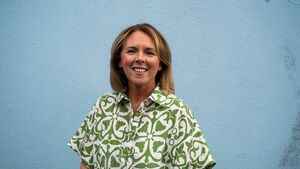Respite care is no Gray area for Amanda

Enniscrone woman Amanda Gray is Director of Services for the Republic of Ireland with Praxis Care Ireland.
Amanda Gray has always had a calling towards working with people who have intellectual or physical disabilities. Like many journeys however, that’s not what she started out doing but eventually the pull became so strong that she just had to answer it.
The Enniscrone-based lady is now the Director of Services for Praxis Care Ireland, a service which provides support to 450 people in the Republic of Ireland, with many centres located in the West of Ireland.
We sat down to talk at the 40th anniversary celebrations for Praxis Care in Ballina, as Amanda told me about why she felt this was the right path for her.
Amanda, thanks for chatting to me. Tell me a little bit about yourself first of all?
I was born in Birmingham and both my parents were Irish. Dad's from Enniscrone and mum's from Belmullet. I lived in Birmingham until I was 16. We came home at that point to Enniscrone. I went to school in the Jesus and Mary Convent in Enniscrone – I joined in fifth year. So I did my Leaving Certificate, then I went onto third level in Galway and got a business degree. I went off to Dublin to get a job. I was probably 21 at the time. I got a job working in accounts, on the administration side of it. I stayed with it for four years but that role wasn't really for me – but I always had an interest in social care.
When I was applying for the CAO, that whole system was new to me, being English. I went for Galway because I liked Galway as opposed to going for the course that I really liked. And at the time, Galway didn't do social care.
You said you always had an interest in social care, where did that come from?
My auntie has Down Syndrome and she actually lived in Cregg House Services – she was one of the first people to move out into the house in Tubbercurry. And so I probably always had an interest in that side of things. I was going out with my now husband Aidan and he knew I wasn't very happy in the role I was in and he said, just leave. So I applied for a lot of jobs in social care, but you couldn't get a job without a qualification or experience. And you couldn't get experience if you didn't have a qualification. Eventually I applied to do the course part time and I found a job where I was able to do that. So I started working in a residential centre in Dublin for people who were deaf blind and had profound intellectual disabilities. And I studied at the same time and worked my way up.
What came next for you?
I had my first child. We were still living in Dublin and I was working there. We were building a house at home in Enniscrone as well at the time. We always knew we wanted to move home at some point. I remember having to drop Sean off to the creche the very first day I was going back to work from maternity leave and he was probably about seven months old and I'd done all my checks and it was lovely creche, and I was very happy with it, but I can still remember dropping him off and driving to work and crying the whole way. I remember going in and talking to my boss and I said just having to leave him with people that you don't know was a strange feeling. It kind of changed my perspective of what families have to go through. And sometimes you don't see that when you're working and the kind of battle that families have and the trust that they put in you when they leave their children. So it stuck with me all that time.
So I went back to work after I had Sean and then had another baby, Holly. I went back to work for a very short time and then eventually I decided we'd move home to Enniscrone, and I was lucky enough to get a job. It was called a Community Options Project. The ‘Time To Move On Policy’ was just coming in and they were looking at Decongregation. So it was a project around that in Mayo, working with people with physical disabilities, and that gave me a different type of experience. From that, I was seconded to the HSE, and that was Decongregation as well. Then a job came up with Praxis as Head of Development.
Praxis was looking to develop its first services in the West of Ireland so I applied for that post and got that and then moved into operations a bit more. And the services continued to grow and develop. After I joined, we were expanding. We took over a number of services down in Cork and I was driving up and down every week. It was a big takeover, so at that point then they advertised for a Regional Director. I applied for that and I was successful and then last year, I applied to become Director of Services for the Republic of Ireland and was successful.
Praxis Care is celebrating 40 years this year – tell us a little bit more about the work you do.
Praxis was incorporated in 1984. We started out in the north of Ireland and we then moved into Isle of Man and then England, and then Ireland in 2006. We work across six of the different CHO areas. We work in the east, we work in the west, the north west, and the south of the country. Across the whole of the organisation, we support 1500 people and we employ 2000 staff. And then in the Republic of Ireland, we support about 450 people and over 600 staff. Most of our work is residential service and daily services and also respite services. All our funding comes through the HSE. We're a registered charity, so we're a section 39 organisation, and we support people who have intellectual disabilities, autism and mental ill health. More and more we're seeing that the services that are needed are really for people with quite complex needs and a lot more kind of emergency placements. There's not enough proactive planning for the needs of people with disabilities. And I know the HSE are working really hard to do that, that it doesn't become an emergency, but it is at the moment, it's quite difficult. And families get to that state where they just can't continue to provide support.
Respite care is something that continues to grow in the HSE, they're placing a big emphasis on it, and they're increasing the funding around it. And that's really important because it will mean that people can stay at home for longer because families don't want to see their sons and daughters have to move out. We work really hard when that happens, when they do have to move out, to include the families to make sure that they're part of that planning of the new service, to make sure that they're part of that transition and the journey when they come in and that when their son or daughter moves into their new home that they feel like it's their home, that they're just as welcome.
What keeps you driven Amanda?
I think it's a few things. I think what keeps me working in social care is that I know the importance of the work, I know the difference it makes. And I probably know that first-hand from seeing my own Auntie Tina. And she was always, and still is, the centre of the family, the thing that keeps everybody together. My mum and her sisters and brothers, when Tina would come home for the eight weeks of the summer, they'd take a week each. So that wrapping, that support around people, I see how much that is needed. But I also got to see first-hand how important the supports that the HSE offered to mum's family for Tina were. She loves her home, she loves living with the people that she lives with.
What we offer is so essential to people, it keeps me motivated to keep doing it. But it is stressful – it's very busy. You're kind of balancing things all the time. I started working for Praxis in 2018 and they were a lot smaller then, and I remember you'd go to your appraisals and I used to describe the organisation as a big family. Even though six years later we're even bigger and the team has grown significantly, we come together once a month and we have an operations meeting and it still feels like that family. We have a laugh because you have to be able to laugh in this work because it can be so stressful.
The service is continuing to grow as you said?
We're actually renewing our strategy now looking at it from 2025 to 2030, but we've no big growth targets in it. I think that's important because we're a charity and we're in it because we want to provide the best services at the best time, with the right people, and you don't want to be looking to meet growth targets because then it can dilute that. We get referrals all the time for different areas. We never look to start in a new area where a service might be isolated. We try to grow from where we can, where there are existing services and that's continuing to happen.
In Mayo now, we have a day service and we have three residential services. We have residential services in Sligo, we have two in Leitrim, we have three in Donegal, and even now we're looking at others in Donegal, we're looking at other residential services in Mayo – but slowly. There's no pressure to do that. We would have conversations about where needs are and sometimes you have to go out, you have to look at the house because you know that there's a need there in the future. Then when that person comes in, you can design the service around them to meet that. So we will grow, I've no doubt about it, but we're under no pressure to do it and we want to do it in the right way so that we get the best outcomes for people.





